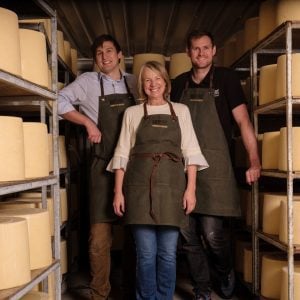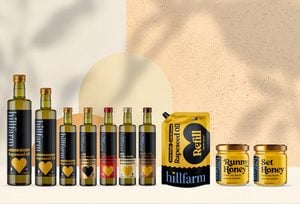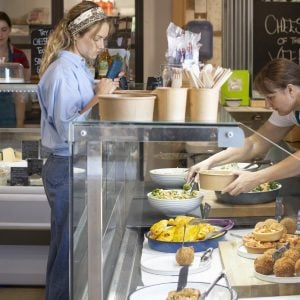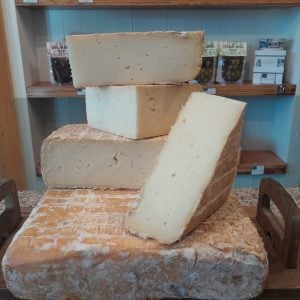
It may have begun as purely an online business but cheesegeek has continued to diversify and do things differently – including a move into supplying supermarkets. Its founder tells Michael Lane that every move has been about broadening the market for artisan cheese and discovering an untapped customer base
Cheese has definitely caused a stink on public transport in the past, and it’s certainly been banned from it before, but the most recent high-profile incident in the UK was very different from the classic ‘Paris Metro vs Époisses’ myth.
For a start, no actual cheese was involved – just a photo of some. But this was enough to prompt Transport for London to pull the plug in September 2023 on an advert featuring a picture belonging to cheesegeek – citing the clampdown on promoting unhealthy foods dubbed HFSS (high in fat, salt and sugar).
The advertisement on the Underground wasn’t even taken out by the online cheese supplier and wholesaler directly (it was part of a campaign by its landlord Workspace celebrating a range of its tenants), but its withdrawal ended up being a positive thing for cheesegeek founder Edward Hancock.
His impassioned LinkedIn post about censoring cheese on health grounds (arguing that his products are not the major cause of childhood obesity that TfL had inferred they were) was picked up by the newspapers, putting his company firmly in the spotlight.
“The decision was utter nonsense,” Hancock tells Good Cheese, while also acknowledging that cheesegeek ended up getting way more publicity than it would have done if the advert hadn’t been banned.
You start thinking it’s going to be one thing and you realise the opportunity’s even bigger.
It was an opportunity to address a misconception about cheese and promote his own business, but Hancock says it was also a chance to promote artisan cheese to a far larger audience.
“This kind of thing reaches people that would not be thinking about buying cheese. And wherever they go after that – whether it’s their local cheesemonger, Neal’s Yard at Christmas, on a tourism visit to The Courtyard Dairy in Yorkshire or buying a subscription from us – that’s a great thing for me.”
This view goes some way to addressing another common misconception that Hancock has encountered since setting up cheesegeek – that an online business like his is on a mission to take market share from traditional cheesemongers. The truth is he thinks there are far more consumers out there who could become potential artisan cheese enthusiasts across all channels.
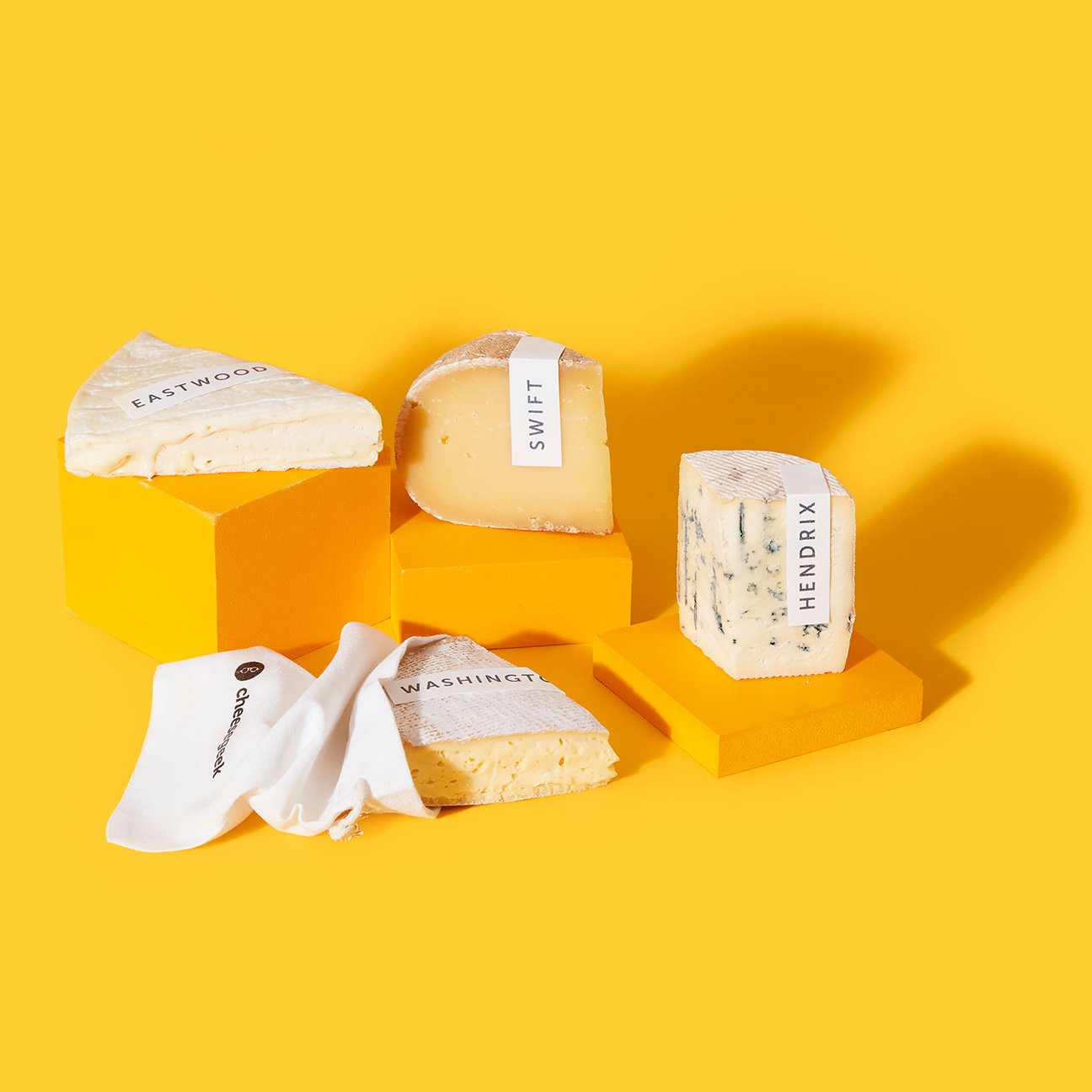
As a result, even Hancock has had to adapt his business model in the eight years since he began trading from the utility room of his mum’s house. Of course, it has built up a viable online business, selling subscriptions and gift boxes, but cheesegeek has also diversified into wholesaling to restaurants, developing exclusive cheeses with producers and even launching a branded range in Sainsbury’s.
“You start doing it, thinking it’s going to be one thing and you realise the opportunity is probably even bigger than you initially thought,” he says. “In the US, the proportion of speciality cheese sales is over 21% of overall cheese revenue. In the UK it’s 12% – that’s according to Mintel in 2024.”
“The more I read these numbers, the more I feel that we’ve got a real opportunity to make a change and a huge difference.”
The idea for cheesegeek came nearly a decade ago, while Hancock was still working at a hedge fund. Professionally, he had been doing lots of research into the psychology of consumers, purchasing decisions and the power of brands. On a personal level, his foodie obsession began on childhood family holidays to France and had grown to the point that his nickname at university was “the Cheese Monster”. But, even with his knowledge, he still found cheese shops overwhelming, even “intimidating”.
“All of these things came together, with me thinking ‘I wonder if I can build a brand that is more accessible, slightly more modern, and try to leverage some of the things I’ve been learning about how consumers behave’.”
While he praises the work that many established wholesalers and retailers have done in fostering producers and developing cheese over the last 30 years, Hancock says he felt his business should concentrate its attention on the consumer – especially all the people out there that aren’t especially engaged with artisan cheese.
As he points out, most people will tell you they love cheese but they can’t name more than a handful of varieties. “There’s a gap there and that’s what we’re really trying to bridge.”
But before a business can address that gap in knowledge, Hancock says there is a physical intimidation factor to overcome.
“Someone I worked with previously told me the most common thing that people say when walking into a cheese shop is ‘I’m not a cheese expert’.
We have to make it acceptable to have great cheese in multiples
“The first thing they’re trying to do is go on the defensive.”
Cheesegeek’s modus operandi is all about disarming the situation with a combination of colourful (very yellow) modern branding, humorously named selection boxes, and clear directions on the website guiding visitors to products for gifting, entertaining and special occasions like Christmas. When you click on individual cheeses, the language used to describe them is more playful than the usual patter. Tasting one is described as “like watching TV in HD for the first time” and another is billed as a “rockstar” and there is always very clear explanation of why someone might like it alongside the more nerdy information.
No matter how good a salesperson’s chat is, there will always be the barrier of price when it comes to cheese – and Hancock is keen to steer the focus away from it.
“We try and dilute the conversation about how much the cheese is costing and make the conversation more about the experience.”
An entry level box from cheesegeek is £38, which is effectively 600g of cheese at £50/kg but he wants them to “forget about price per kilo. For £38 what you’re getting is an experience, you’re getting curation, you’re getting convenience, you’re getting to score the cheeses you’ve tried and rate them for next time. It’s interactive.”
It’s a convincing pitch but that doesn’t mean retaining customers, and the ultimate goal of converting them into subscribers, is an easy game. More often than not a consumer’s first interaction with cheesegeek is buying a gift for someone else. The next stage in the product’s journey is at the table with the recipient and their guests (4-6 people usually), who are all hopefully drawn in by the aforementioned experience and then led to the website by marketing inserts and QR codes.
Hancock says that, in theory, if you can get that right you’ve acquired at least two customers in one transaction and the best result is that at least one of the people involved will then progress to taking a subscription.
The initial acceleration of the business from starting out in October 2016 was “very very quick” but Hancock says he was beginning to hit a plateau in sales. That was until Covid arrived.
“The pandemic exploded everything for online so essentially then it was just a case of trying to manage this crazy demand,” he says, adding that the first year after lockdowns was challenging. “Generally a lot of e-commerce businesses, including us, had probably expected a continuation of that growth, which didn’t materialise.”

Although subscribers didn’t fall away, the reduction in one-off box sales made Hancock realise that cheesegeek was overexposed and needed to diversify, rather than plough money into marketing. The answer was to move into wholesaling.
“What we don’t do is try to win business that’s just providing white label to a catering company – and the cheesegeek brand is lost along the way,” he says, pointing out that clients such as wine bar chains Humble Grape and Vagabond, as well as Adam Handling’s restaurant The Frog, all display their supplier’s name on their menus.
Hancock describes the move as “a cash-positive way of acquiring customers”, with every one of these partners potentially funnelling people back towards online sales.
On the retail side, cheesegeek has just begun working with Selfridges’ food hall but it also has also raised eyebrows by supplying a packaged and branded range to Sainsbury’s nationwide.
“The minute you start working with a retail multiple people will start making judgements. What was interesting is the negative comments and pushback were from mongers rather than producers.”
In fact, Hancock says there was total buy-in from producers, who appreciated the theory behind introducing supermarket consumers to artisan cheese during their regular shop, at a decent price point of £4.50.
“What needs to happen in the UK is we have to make it acceptable to have great cheese in multiples,” says Hancock, adding that this also means normalising these cheeses appearing both in supermarkets and independent shops. “You’re not going to unlock the next stage of growth without that happening.”
He bolsters his argument by recalling a recent visit to Cashel Blue’s makers in Ireland and seeing their cheese in chains like Lidl and Dunnes. France, he adds, is another good example of a country where multiples carry top quality food. And returning to his point about the USA’s market, Hancock cites Kroger’s acquisition of high-end cheesemonger Murray’s and the rolling out of counters across its shops.
Ultimately, Hancock feels British cheese is in a “precarious” position. Producers are folding, other makers have no succession plan and many suppliers are facing a glass ceiling.
“The only way they can continue to grow and make more money is to consider multiples, which has been closed off because the minute your cheese is in a multiple you’re alienating your other routes to market.”
Again the spectre of price is there to stymie progress but Hancock argues that you can have two different pricing structures and that will be accepted by consumers in the same way they will pay four times the retail price of a bottle of wine if they have it in a restaurant. He also points out that he is testing the theory himself.
“In Sainsburys, you’re buying a piece of our cheese that’s £4.50 as part of your weekly shop, to try and elevate your Friday night. When you come to our website you are buying an experience. It might have the same product in it but it’s a very different use case.”
Hancock has also tried to assist cheesemakers’ growth via another project, which has seen him work directly with them to develop new cheeses made and sold exclusively by cheesegeek.
Dubbed the Genesis range, the current line-up of four cheeses was developed with two producers.
Hendrix is essentially a different format and flavour profile of Caws Cenarth’s Perl Las blue, while Washington draws upon the knowledge and unused larger moulds the Welsh maker had in its dairy for the Golden Cenarth washed rind cheese.
Meanwhile Bath Soft makes the accessible brie-style Eastwood and adapted a specific 9-month age profile of its Wyfe of Bath to create a cheese called Swift.
“All four are cheeses that the maker had capacity to make but didn’t have the route to market, so what we’ve done is work with them to refine and tweak and open up a new product that they automatically have a market for.”
Given this project’s mutual benefit to cheesegeek and the makers, Hancock says he is keen to expand the range and hopes to explore more possibilities in the future. More physical retail partnerships or ventures are also something he won’t rule out either.
If the last eight years are anything to go by, it’ll certainly be worth watching what direction Hancock and cheesegeek take next.
thecheesegeek.com
This article first appeared in Good Cheese Magazine 2024-2025
